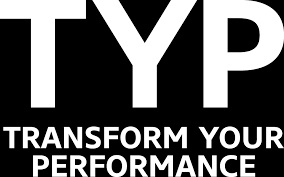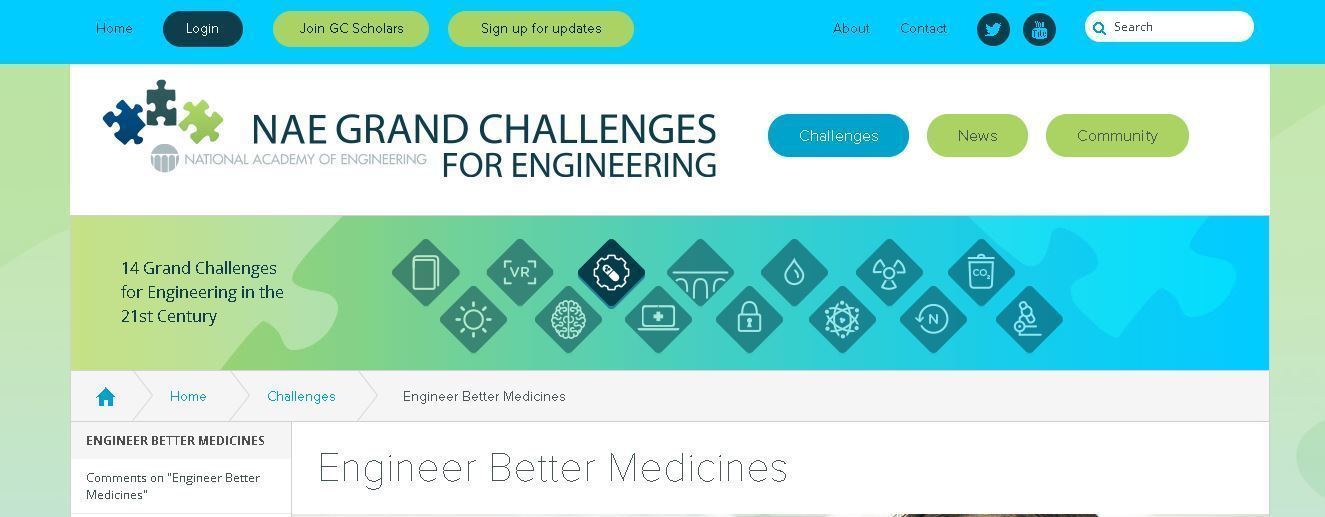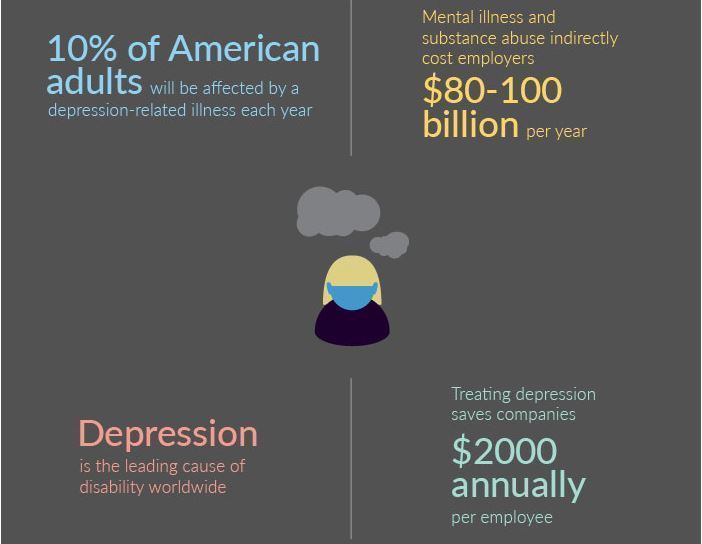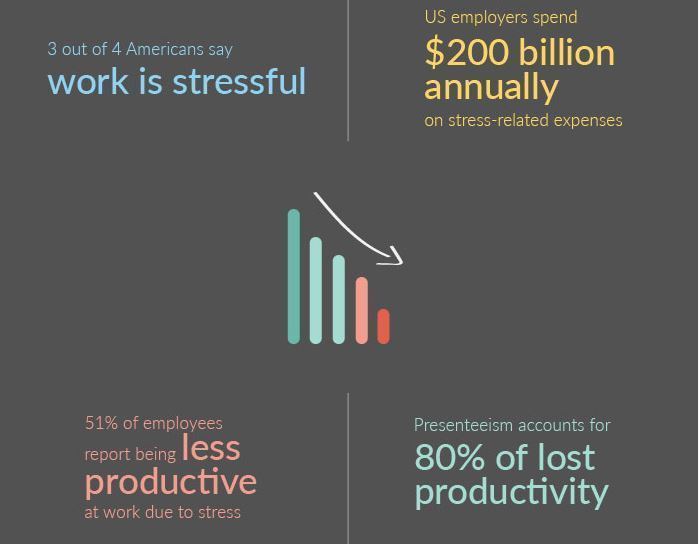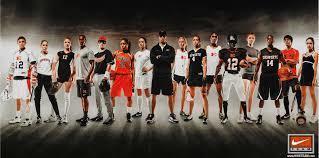Tag Archives for " athletics "
Communicating With Each Other
“Get and give your best, you are rewarded for it.” – Raj Gavurla
Communicating with each other occurs well most of the time. When does negative conflict arise? It’s when the communication isn’t flowed through to its conclusion. Like a story, communication takes as long as it needs to take based on the situation. It creates value.
Examples:
Someone says: “we”, “they” [If it’s not clear who “we” or “they” is then ask.] You ask: “Who is we?” or “Who is they?”
Someone says: “You made mistakes.” [If it’s not clear what they are referring to.] You ask: “What mistakes?”
Someone says: “If someone is interrupting you.” [and it’s not obvious why] You ask: “Why are you making that sound?”
Someone says: “That’s good, great, or they like something.” [If it’s not clear what they are referring to.] You ask: “What’s good or great about it? Why do you like it?”
Someone says: “You need to grow up.”
You ask: “What do you mean?”
Someone says: “You are a nerd.”
You ask: “What do you mean?” or “Who is a nerd?”
Someone says: “You are a geek.”
You ask: “What do you mean?” or “Who is a geek?”
Someone says: “I want confidence.”
You ask: “Do you think we don’t have confidence?”
Someone says: “I don’t know.” [If it’s not clear what they are referring to.] You ask: “What do you not know?”
Someone says: “I’m hurt.”
You ask: “What hurts?”
TEAM: Together Everyone Achieves More
Recently, I’ve been hearing about how everyone gets recognition or an award for participating on a team. The only awards that mean anything are the first three. All the others don’t have meaning.
If you are a coach or lead a team, this is my perspective on participation awards:
My only criteria for someone being on the team is “they want/aspire to consistently perform better at what the team/they do and what the team/they aspire to”. Each progresses at their pace and some will make better progress faster and be rewarded more. However, each does deserve an award.
Examples: You want/aspire to perform (play) better doctor, engineer, lawyer, accountant, chemist, business owner, boss, manager, supervisor, professor, football, basketball, soccer, tennis, track, and golf. As long as the people on your team have this as an aspiration and they are working on it then it’s your job and their job to do for and help each other make better progress. As you consistently do this, you will like what you achieve and when you apply this to other aspects of your life you have a robust living.
Therefore, you need to share with each other what you are working on. Realize what people are “working on” is very important to them, therefore, don’t be negative about it or make senseless comments, “same story”, “what’s it getting you”, etc.
“Do not overestimate the competition and underestimate yourself.
You are better than you think.” – Tim Ferriss
For programs and services, contact Raj at 864.569.2315, raj@rajgavurla.com, LiiiVEN.
Consistently Perform Well In All Aspects of Life: Win and Make Better Money The Right Way
“Consistently perform well in all aspects of life: Win and make better money the right way.”
– Raj Gavurla
Something annoys me every time it happens. While doing my track training at a local high school (the high school is not important) I see and hear teenagers using racial slurs and denigrating each other. I know we are taking about teenagers whether they are thinking they are “being cool” or “using it as intimidation”.
A few days ago, it was something I hadn’t seen before. Football players were using racial slurs while their coaches were present. One set of coaches were high school coaches and the other set of coaches were coaching middle school kids preparing to play for their high school. Racial slurs were being used by the high school teenagers to their teammates during practice and while taking water breaks. The middle school team wasn’t using racial slurs or denigrating each other. In fact, during their conditioning a teammate was last in finishing his track work and the whole team ran to him with him finishing ahead of some of them on purpose. Obviously, learning how to run track would make it easier for this boy as the players and coaches are relying mostly on talent at that age so he doesn’t always finish last.
Stopping the “nonsense” of teammates using racial slurs and denigrating each other has high-value worth for forward performance progress socially and environmentally. Leadership by the coaches would be of great use. If I was a coach, I wouldn’t allow my players (team) to use racial slurs or denigrating word choices. My working with athletes at all levels the use of racial slurs and denigrating word choices might work temporarily but not as they progress to realize it takes real learning and application of skill to progress from high school to college to professional in anything they choose to do in education, sports, business, and life.
Cultivating this approach develops, builds, and grows character and dignity which is of high-value worth as we are experiencing societal and cultural transformation in America and throughout the globe.
“Do small things with great love.” – Mother Teresa
For programs and services, contact Raj Gavurla at 864.569.2315, raj@rajgavurla.com, LiiiVEN.
Better Self-Management
“Better self-management: Put brain, heart, and muscle power into it.” – Raj Gavurla
Lately there has been an increase in the use of the word “he/she/they/we don’t want” or “attitude” used instead of really helping the person who you think should want or have a positive attitude towards something.
Examples:
1. “Because he/she doesn’t want to make an A”. Most people want to make “A’s”. So it’s ridiculous to say they don’t want to that’s why they aren’t. Yes, the ability to teach is not a skill everyone has developed, built, grown, and usually the people who don’t have this skill revert to the two reasons why; “they don’t want to” or “attitude”.
Everyone’s situation is different, however, one way to increase reading comprehension, retention, and application of learning might be the following:
1. Read the first paragraph of the chapter
2. Read the last paragraph of the chapter
3. Read the headings in the chapter if present
4. Ask yourself questions as you read specific sections
5. Write in the margins to denote its significance to you
Yes, this takes more prep time/work, however, it makes you faster in the end because of your ability to comprehend, retain, and apply the learning.
2. You see this in the workplace also because people aren’t making sure all the relevant information is there or they have anxiety. Trying to get through it as fast as they can without making sure to first check to see is all the relevant information there and if something is missing find it (research) and then put the steps needed to complete it with an estimated amount of time. Realize, most people are working on multiple projects at work so put that into your time estimate and assign your time as “uninterrupted”, “regular”, or “interrupted” to accurately estimate the time. This will take undue pressure off of you. If someone wants you to do it faster without providing you the tools or methods to do so then tell them “that’s as soon as I can have it done”. Put some margin in there for breathing room and unexpected events. Planning helps.
3. When I taught Career Planning & Exploration my students were future medical assistants, owners, entrepreneurs, computer technicians, and business management professionals.
To prepare, I learned about their course of study to grasp some of the vocabulary to relate to them. As we prepared for mock interviews, I would ask relevant questions pertaining to their field as being knowledgeable and then play the role of someone who wasn’t knowledgeable about their field but had a role in learning to run a better business. Seeing their qualitative answers in the debrief was insightful because of what was surprising, shocking, or went unnoticed. As they sat in a waiting room to prepare for a mock interview you could sense, see, and feel their brains, hearts, and muscles working. One had received news a few hours before that her apartment was flooded, one was battling chronic pain, and the others had their situation.
They all did well in their mock interviews because of “better self-management”. There were areas they felt they could have done better. That’s very important to know you can do better by increasing your skills although you are already skilled (competent) in a specific skill.
So, to transform your performance think of these examples and how you relate (“adaptability link”) to them. “Better self-management” makes it easier for you to transform your performance.
“Believe you can and you’re halfway there.” Theodore Roosevelt
For programs and services, contact Raj Gavurla at 864.569.2315, raj@rajgavurla.com, LiiiVEN.
What Robust Olympics Memories Do You Want?
“What robust Olympic memories do you want?” – Raj Gavurla
Robust Olympic Moments: https://www.theguardian.com/sport/series/50-stunning-olympic-moments
“The future belongs to those who believe in the beauty of their dreams.” ― Eleanor Roosevelt
“You can have it all. Just not all at once.” ― Oprah Winfrey
“Dare to live the life you have dreamed for yourself. Go forward and make your dreams come true.” ― Ralph Waldo Emerson
For programs and services, contact Raj Gavurla at 864.569.2315, raj@rajgavurla.com, LiiiVEN.
National Academy of Engineering: 14 Grand Challenges For Engineering
“Brain, heart, and muscle power. Not willpower.” – Raj Gavurla
“Everyone is smart. What do you want to study?” – Raj Gavurla
Which one of the NAE Grand Challenges For Engineering is most important to you? I selected two because one is essential to the other thirteen. Combined they have the greatest impact. They are Advance Personalized Learning and Engineer Better Medicines. Which ones do you want to fund?
Advance Personalized Learning
Make Solar Energy Economical
Enhance Virtual Reality
Reverse-Engineer The Brain
Engineer Better Medicines
Advance Health Informatics
Restore and Improve Urban Infrastructure
Secure Cyberspace
Provide Access To Clean Water
Provide Energy From Fusion
Prevent Nuclear Terror
Manage The Nitrogen Cycle
Develop Carbon Sequestration Methods
Engineer The Tools To Scientific Discovery
I selected Advance Personalized Learning because learning, its application, learn how to learn is the catalyst to transform performance, innovation, and/or entrepreneurial leadership and to live a robust life. I selected Engineer Better Medicines because of devastating side effects, allergic reactions, and to eschew medical hardship and emergency room visits.
Engineers are developing new systems to use genetic information, sense small changes in the body, assess new drugs, and deliver vaccines.
Doctors have long known that people differ in susceptibility to disease and response to medicines. But, with little guidance for understanding and adjusting to individual differences, treatments developed have generally been standardized for the many, rather than the few.
How will genetic science change how medicines are made? Click here to learn more: http://engineeringchallenges.org/9129.aspx
“The best way to predict the future is to create it.” – Raj Gavurla
For programs and services, contact Raj Gavurla at 864.569.2315, raj@rajgavurla.com, LiiiVEN.
My Tennis Coach Came To A Match After A Month
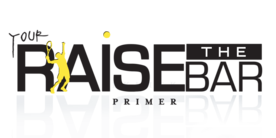
I was serving up 40 – love and double faulted. He said, “I hate double faults”. Then his narrative started. “Consistency.” “You’re up and down.” So, I had to make sure coach had been tracking my progress. I told him we haven’t lost a doubles match in three weeks. I asked, “have you been talking with people about my progress?” He smiled a little. Then, I showed coach me playing better tennis.
I asked him is he using his Your Raise The Bar Primer Mental Performance Tools workbook? I’m making sure he’s doing his mental performance skills homework. He didn’t say anything. Then, I hit a few more shots. One a one-handed backhand winner with an extended “ahh” added to relieve tension. Then, I hit another winner and coach wasn’t watching. Later in the match, I hit an overhead with an “ahh” and fist pump towards my partner to acknowledge our exceptional play. Then I served an ace and said “Coach” looking at him and he gave me a thumbs up.
I realize you probably have a tennis coach, however, by using my Your Raise The Bar Primer: Mental Performance Tools workbook you will be prepared when your coach checks on you. Coach knows about the technique of tennis (“how to hit the ball and positioning”). I missed a low volley and I asked my coach what I should do. He said, “footwork”.
Since I’m the mental performance skills coach, I know it wasn’t footwork. It was because I hit the low volley without a target. In other words, just getting it back. The problem is the ball didn’t know where to go to. Keep in mind my coach is a cabinet maker. I just call him “Coach” because it’s funner and he does act like my coach.
However, for real tennis coaching both tactical/technique/tennis management and private mental performance coaching visit http://www.rajgavurla.com/diamondforwardtennis.html. Our services and my workbook are available for purchase and you can contact me if you are a professional, college, academy or aspiring tennis player looking to raise the bar in your tennis performance. Whether you already have a coach and just want to boost your play with our services and products or you want us to chart your tennis career, contact me (performance consultant and coach) and I will coordinate with my partner who works on the tactical/technique/tennis management to highly customize the best package for you.
It’s a week later and I just finished playing tennis. Coach was there and asked “How are you?” in a way that meant, “I like what I’m seeing!” Coach seems more mature in his approach. I asked him again if he’s using my workbook. I saw a gleam in his eye meaning “yes”. We played doubles together and Coach was making fist pumps towards me. Wow! He also was praising his own shots. Coach is doing my workbook. His lens and physiology and ability to play better tennis are quite obvious. I’m looking forward to seeing coach’s practical forward mobility.
What’s The Difference Between Attending A Live Event & Watching A Video?
“You’re unique, different, and in leadership of your situation. Don’t compare yourself to anyone.” – Raj Gavurla
Have you attended an event in person and watched the same event on video? There’s a huge difference!
1. In person attendance, one actually senses, feels, and experiences the ambiance of the entire event. The featured speaker(s) message is more meaningful and engaging. You see things you don’t see watching a video. You participate in select activities and network (build relationships) with attendees (people you know and those you don’t know). Also, if you are fortunate you get to interact with the speaker(s) by asking questions or attending a private dinner the night before.
You might schedule other meetings during non-event time and see a new place or experience a magnificent place again. It also serves to get you out of the office and realize how everything is in some way interconnected. You broaden your business and life story.
2. When watching a video the value is greatly reduced. The meaning of what is being said can be distorted because the connection of being there in person isn’t there. If you think, how can that be? Then, video an interaction with you participating and then watch the video in private. You’ll see the differences and meaningfulness in value decrease.
There is a time for both. Determine which is of most value for your situation.
“Don’t let the noise of others’ opinions drown out your own inner voice.
Have the courage to follow your own heart and intuition. ” – Steve Jobs
For programs and services, contact Raj at 864.569.2315, raj@rajgavurla.com, LiiiVEN.
New Resource:
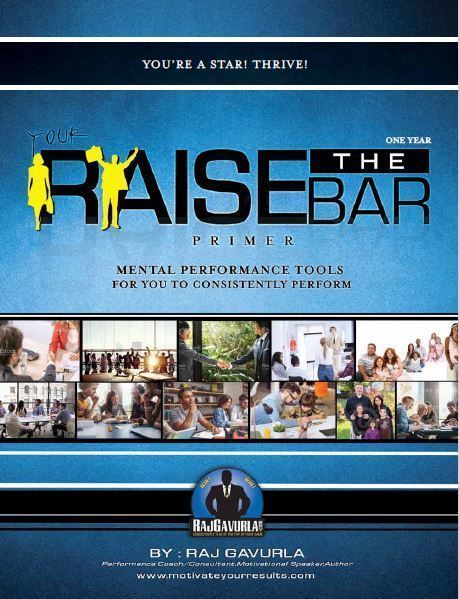
Consistently achieve your business goals, break-through performance barriers, and stay motivated and inspired with my mental performance coaching workbook.
Build and grow your mental performance skills using your own thoughts with a very simple mental structure. The workbook becomes customized by you with your own thoughts because your mental challenges are unique to your level of business and what’s happening in your life. You practice the knowledge skills of business. How about the mental performance skills to consistently learn how to perform in “the zone” (optimal performance) for success? Order Now! https://www.motivateyourresults.com
How To Win Playing Better Tennis?
“Win playing better tennis.” – Raj Gavurla
I really understood you had a tennis match after watching the NBA Playoffs last night. How did it go? My job is to performance consult and performance coach at the professional, college, academy, high school, and recreational levels. The main difference between them is better mental performance skills. Most of the pros know how to hit the ball. It’s bettering their mental performance skills to play better tennis they need to win more.
Yes, I also play tennis and I like playing with all levels because I approach each with a different frame of mind. All levels of players pose a different challenge to me. Recently, I’ve been playing with a group of recreational players. They see me warm up beforehand, bring my water, and my chair and watch me as I warm up and say “that’s what we need to do”. Yet, week after week they come out and just start playing. They warm up without practicing their volleys and overheads. It’s as if they are enthralled with the baseline although they are playing doubles. There is no serve and volley except me.
The wild thing is it is just as competitive as a Grand Slam Final with lesser mental performance skills and tennis skills. Since I can help their mental performance skills, I do and they’ve wised up and some take lessons on tennis technique (how to hit the ball better). They haven’t wised up yet to take mental performance coaching lessons.
While playing “my coach” (I call one of them that). He tells me to “play with better players” and is very hard to please. I can hit ten “nice” or “good” shots and he’ll point out the three I didn’t hit well. He compares me to professional players like Federer and Nadal. I’m honored by the comparison as he does know what he’s talking about when I’m not consistent or don’t move into the right position. He says, “I watch them on T.V. and at live tournaments”. Obviously, I’m not as robust of a tennis player as the pros.
Recently, we were closing out a match and he was telling me not to do this and that. I called a mental performance skills coaching timeout. I said, “all this negativity isn’t helping us”. How about saying, “finish the match” or “see the ball”. A week later we were in a similar situation, and he was encouraging and motivating and for a long period silent. After we won, he actually complimented me with “good”. Wow! Then he said “you need to win a Grand Slam”. I wish he was around sooner in my tennis life.
I gave him an autographed copy of my Your Raise The Bar Primer: Mental Performance Skills workbook. He looked at it and said “that takes commitment”. My response, you can stay at status quo and go through the motions week after week or have fun and win more. Which do you want? My coach has been working on it. I already see a difference in his ability on the court. If you need cabinets installed that’s my coach’s real job.
Yes, I do need to play with better players but I enjoy playing with all levels and at the recreational level I’m able to work on shots that I’m not able to do so against better-skilled players without first honing it. Some of the guys played in high school and one in college so it’s not as if they are beginners.
For those who still are working on technique, here are six videos to watch showing the legendary, Andre Agassi. I myself am hitting better volleys, overheads, and serves after watching. Remember, you also need to work on bettering your mental performance skills. The combination helps you win playing better tennis.
“Children are wonderfully confident in their own imaginations.
Most of us lose this confidence as we grow up.” – Sir Ken Robinson
For programs and services, contact Raj at 864.569.2315 or raj@rajgavurla.com, LiiiVEN.
Performance and Entrepreneurial Leadership In Management Needed for Mental Health In Your Workplace
“Win your better outcomes: High Value and Valued ROI” – Raj Gavurla
Your valued employee is missing work more often and you can tell some things aren’t making sense. As leadership and management, you think about what’s happening to them. Then, your office manager or human resource person informs you they gave them the Employee Assistant Program (EAP) phone number. Of course, something serious happened yet you’re still puzzled. However, because you don’t know what to do or policy you don’t initiate to share authentic dialogue with your valued subordinate.
Your subordinate doesn’t know what’s happening as all they think is I’ve been having very unusual thoughts and not feeling well. It’s as if the microprocessor (brain) in my computer (body) isn’t consistently functioning. They really don’t know when told they have a mental health diagnosis what that means. They just hope the doctor determines the right treatment to help/cure/exhibit teamwork to allow them to successfully continue working and living a robust life. Sometimes for a percentage of workers, this happens and they continue successfully working and living a robust life. Often times the facts are this doesn’t happen and your employee’s performance is valued for periods of time and then an episode or something happens and they miss work or they aren’t exhibiting their consistent valued performance. A mental health challenge doesn’t discriminate based on socioeconomic or sociodemographic status.
There is a highly customized fluid solution for your valued subordinate. An example is:
1. You (Boss) initiating and sharing private authentic dialogue with your employee. It takes research better outcomes, preparation, interaction, and communication to deliver better outcomes for your subordinate (employee).
2. Understanding what his or her treatment plan is and the teamwork needed.
3. Forming a “small individual/personal matters team/group” to help your subordinate by involving a select group of trained employees as this employee’s support system in your workplace.
4. Understanding the high-value importance/urgency of their family, work, and financial sustainability to your subordinate’s wellness is essential. Their family is experiencing similar uncertainty as you about the well-being of your employee.
5. By taking the initiative and being proactive with a process your employee becomes better and your costs tremendously decrease because your employee is still able to work although it might be scaled back and is given the review and evaluation of their work during this time to continue being a forward performing valued successful employee.
Yes, taking these steps are asking for more effort on your part as Boss and employer. However, the following are some of the better outcomes (results) from taking initiative:
1. I know as employer, Boss, team, and employee each is doing everything they can to see each other succeed and your clients succeed. As an employer, you don’t have to do the bare minimum to be in compliance. There are value-add resources that can help you. As a strong mental health advocate, performance consultant/coach, and entrepreneurial leadership expert, my services might be a value-add to your current protocol for this situation.
2. Donating to charity is important and I encourage you to continue doing so to make your business and community stronger. However, a lot of times companies donate to non-profits (a humanitarian cause/need) without knowing the person they are helping to receive support services. By allocating funds for mental health in your company, you are essentially creating “charity in the workplace” and seeing your dollars actually being put to use for your valued employee and receive quality work completed for your efforts.
3. The sensation of having this humanitarian lens is very fulfilling, highly satisfying, and delivers a win for all (your business and community). Businesses are here to contribute to family and societal progress. Being a humanitarian to me means more than “spiritual brothers and sisters have to eat”. Being a humanitarian means “spiritual brothers and sisters have to thrive”. We are very capable of this mission and aspiration being a reality because of the forward progress we consistently make in employer/employee relationships and societal progress.
4. Most likely your employee becomes more loyal and continues to make forward progress in your company. Also, you now have an employee with high-value empathy skills and is part of your succession planning for your “small personal matters team(s)/group(s). Although most of your employees don’t have a mental health diagnosis, they do have mental health challenges whether spurred from a workplace issue or life issue that sharing authentic dialogue with select people in a “small personal matters team/group” would greatly benefit your business.
5. Mental health is our current major employer/social health challenge to the robust viability of our workplace we have to triumph along with cancer (you could imagine this affects a person’s mental health).
6. I’ve heard too many personal stories of talented, skilled, and educated people who are underemployed and not doing meaningful work. Because of this, there might be relationship problems because of the stigma associated with mental health and the individual might lose hope.
Sports often is at the forefront of employer and societal progress. An example is Lebron James addressing the Cavaliers in the locker room, welcoming, and helping Larry Sanders (mental health challenge) join the team and continue to progress in his NBA career. Yes, there are a lot of small business owners who are also helping and supporting individuals with a mental health challenge. How about your Fortune 500, mid-size, or over 50 employees small business?
Remember, being a humanitarian is more than “spiritual brothers and sisters have to eat”. Being a humanitarian is “spiritual brothers and sisters have to thrive”. It’s a win for all. It’s worth it!
If you are an executive, in management, or are a workplace leader, who is challenged by mental health in your business, please contact me to share authentic dialogue. Your leadership is needed and wanted.
“One’s destination is never a place but rather a new way of looking at things.” Henry Miller
For programs and services, contact Raj at 864.569.2315, raj@rajgavurla.com, LiiiVEN.
You Don’t Need To Live A Double Life In Your Workplace
“You Don’t Need To Live A Double Life In Your Workplace.” – Raj Gavurla
Do you come to your job or the playing field leading a double life? You don’t need to. How is this possible? I’m there to work (complete tasks, etc.). That’s what they pay me to do. Years ago there was a job I inquired about with someone who worked for the company. He proceeded to tell me “you have to set up equipment”. I waited to see if he had more to say. He didn’t. I wasn’t interested in the job. Why? Because work is more to me than completing tasks (it’s part of the job) and receiving benefits. I understand you have family and friends outside of work you have fun, rewarding, and enjoyable camaraderie with. How about having fun, rewarding, and enjoyable camaraderie with your colleagues or teammates?
Camaraderie is one of the keys that keeps employees performing, retains, and recruits. It also plays a major role in wellness (well-being), motivation, inspiration, engagement, a positive attitude, leadership, and execution.
What’s a solution to nurture camaraderie in the workplace? By using a small group personal team matters approach. Do you have thousands, hundreds, less than fifty, ten to twenty, five or fewer employees or teammates? The larger the business, organization, or team the harder it is to have camaraderie with everyone. Regardless of size test the following:
Break up into “small personal teams”. A “small personal team” is a group that discusses (has dialogue) about personal matters not directly related to your job. For example, your family, what you’re doing this weekend, what you did this past weekend, your health, nutrition, fitness, your parents, kids aspirations, your non-work challenges, crisis, someone passing, accident, hobbies, movie, best place to get something, book you’re reading, mountains, sports, festivals, etc. Apply the learning.
A Customized Structure Might Look Like:
1. Ask people to participate sharing why. Do not require them to participate.
2. For those who join a personal matters team, make what’s discussed confidential. That doesn’t mean you can’t share your situation with someone outside of your group. Use your discretion.
3. Meet once a week for 45 minutes to an hour in a quiet place (conference room, courtyard, etc.)
4. Talk about and share personal matters important to each group member
5. Close the meeting
Use Metrics and Collect Data On The Outcomes:
Are employees mentally performing better?
Is employee retention increasing?
Is it easier to recruit?
What effect does it have on wellness (well-being), motivation, and inspiration?
What effect does it have on engagement, a positive attitude, leadership, and execution?
Small Personal Matters Team Examples:
Look at an amazing family
Look at a business team. One of the things employees, athletes, investors, donors, and philanthropists look at is the teamwork exhibited.
Look at our military. They have tremendous camaraderie protecting each other, to survive, and protect us. They know each other and have nicknames for each other making it easier to accomplish their mission.
Look at a sports team and you hear athletes talk about the camaraderie or if retired the camaraderie is what they miss.
I remember from reading Oscar Robertson’s biography he worked with people of a different skin color and they never had time for camaraderie. Just do the work because in those times that’s how it was. People didn’t know each other at work and never met outside of work with people of a different skin color. He said, “that hurt”. I’m sure some people of the other skin color had the same thought and feeling, “that hurt”. Thankfully, we the people have made tremendous cultural and societal progress.
Another example, I went to college to graduate/get an undergraduate degree in electrical engineering. That was the main goal. It’s the camaraderie with a few friends I remember and miss most. Although we don’t talk often or see each other as often I know, feel, sense, and believe we are connected forever.
My final example are my friends from Leadership Greenville. I shared with a small personal matters group my mom had a stroke. One told me his dad passed away from a stroke and another told me they had a family member who had a stroke and it’s a slow process. People get better. Until the emergency personnel told me your mom had a stroke, I’ve heard of the word stroke but knew nothing about it. Learning about a stroke and talking with my small personal matters team gave me lived experience insights I couldn’t get from a textbook that helped me to mentally perform to be a caregiver for my mom to make her well. She is talking better and she needs and wants to walk better and drive a car.
Implementing small personal matters teams in your businesses, organizations, and teams might transform the narratives, conversations, and outcomes. It should be helpful too and take pressure off and inhibit the performance anxiety your employees, team leaders, supervisors, managers, bosses, management, executives, and owners are experiencing. Yes, conventions, conferences, and special events are still needed and wanted for all your employees or sports team to participate in.
“A goal is not always meant to be reached, it often serves simply as something to aim at.”
– Bruce Lee
For programs and services, contact Raj at 864.569.2315, raj@rajgavurla.com


